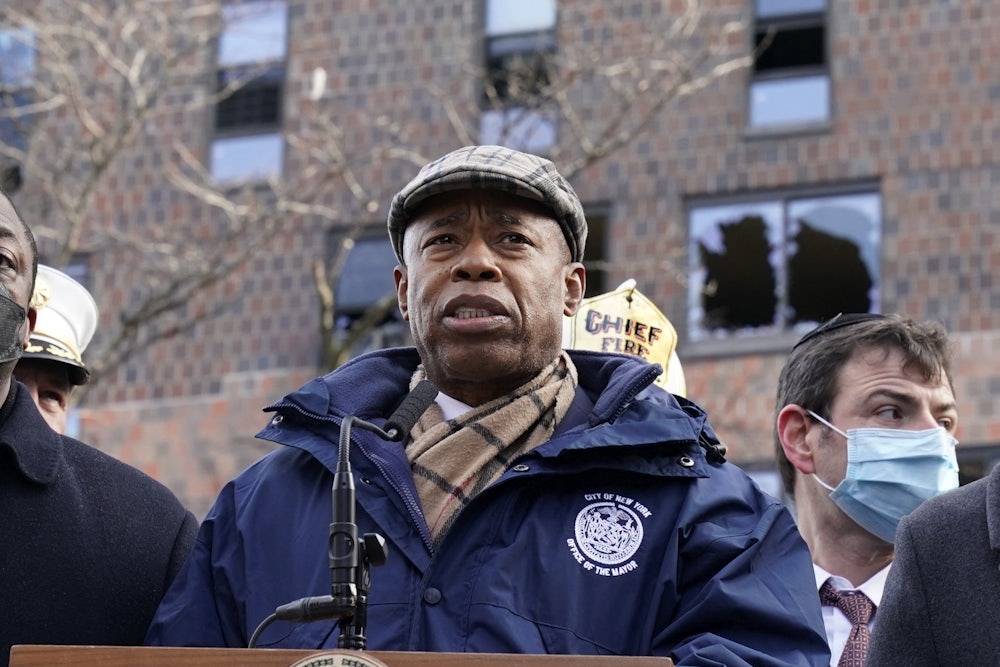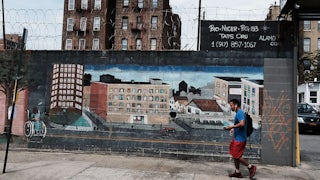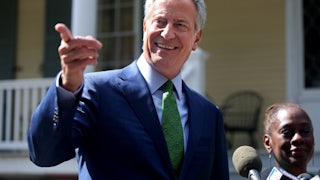Over the weekend, somewhere between defending a string of ethically dubious appointees and urging Democrats to be “radically practical,” New York City’s new mayor made a series of appearances to address a disastrous fire in a Bronx public housing complex. The fire, which killed at least 17, is the worst the city has seen in three decades; according to the fire commissioner, victims were found on “every floor.” Taking a characteristically autobiographical tone, Adams told Fox 5 NY on Monday it reminded him of a “three-alarm fire” he experienced as a state senator (in which no one died): “Every time you hear a fire truck, you relive traumas like this.”
Early reports suggest this weekend’s fire, like many of its kind, was exacerbated by a series of preventable maintenance issues. The Bronx towers caught fire when a space heater that had been running for days malfunctioned, suggesting whatever heating the building provided wasn’t doing its job. The disaster was compounded when a door that should have closed automatically, per legal regulations, stayed open. Last year, residents in the building filed numerous complaints with the city that the heat wasn’t working or that doors weren’t functioning properly. The building, a public-private partnership purchased by a trio of investment firms in 2019, relies on a system of “project-specific vouchers” to help low-income tenants pay their rent; as a councilman told The New York Times, those vouchers couldn’t be transferred elsewhere, and it remains unclear where the residents displaced by the fire will go now.
The Times also noted that one of the founders of the investment group that owns the building had been named to Adams’s housing-specific transition team. But Adams, already facing bad press over a series of mayoral appointments, downplayed institutional responsibility for the first disaster to occur under his watch. In a Monday press conference, the mayor suggested launching a public service announcement reminding residents to close apartment doors if they’re forced to flee.
On election night, as Adams prepared to accept his long-anticipated victory over a mask-burning vigilante, he told a crowd of supporters that it was the day the city would “take off the intramural jersey” and “put on one jersey: Team New York.” Two months later and just two weeks into Adams’s tenure, it seems Team New York is mostly Team Cop, Team Business, and Team Some of Us Get to Do Whatever We Want. Before Adams was sworn in during an indulgent ceremony moments after the ball dropped on New Year’s Day, the question of how the pro-cop Democrat might actually govern was the subject of some debate. Tellingly, most of the murkiness seemed to rely on his overlapping identities as a vegan, a meditator, and former police, rather than his habit of deflecting criticism with absurd metaphors or chuckling about a fabricated speech.
Last week, the politician who ran as a blue-collar candidate who lifted himself out of poverty casually, if unintentionally, derided the 2.5 million workers who make the city run with comments referring to service workers as “low-skill” people without academic achievements, then used his former life as a dishwasher in an apology. The tone was that of someone who believes that anyone who pulled himself up out of the ranks of low-wage workers can say whatever he wants. The former cop who insisted he’d carry his own gun and sheepdog his way through political office turned around and tried to hire his own brother as a deputy commissioner in charge of the mayor’s safety for $240,000 a year. The last job that this brother, Bernard Adams, held was as the “assistant director of parking” for a university several states away. Separately, Mayor Adams is facing criticism for hiring Philip Banks, an unindicted co-conspirator in a federal corruption investigation, as a deputy mayor.
But what else should we expect from a guy who got away with arguably the most clumsy residency stunt in recent memory, or who now-famously drove his Prius over the sidewalk and caused an early-morning traffic jam, only to turn around and yell “got you” at the reporter who recorded the scene? As mayor, Adams is ready to take advantage of every latitude afforded him, and he’s governing with a sort of winking disingenuousness that insists any loophole he finds in ethics laws is just swagger and every problem he encounters can be solved by a little “rise and grind.” The whiplash of his first few weeks in office is made more acute by the fact that Adams pulls his soundbites from such a wild medley of culture-war staples. Over the weekend, facing questions from reporters about the appointment of his brother, he said it was crucial to have someone he could personally trust. “You have an increase of anarchists in this city, country. We have a serious problem with white supremacy,” he said, a call-back to his earlier conviction that protests were spearheaded by “professional” anarchists bused in from outside New York. Does this man really believe he’s under bodily threat from antifa?
The theme of Adams’s first 100 days in office—GSD, or Get Stuff Done—is incidentally a sanitized version of an acronym printed on motivational posters and mugs by guys who refer to themselves as “serial entrepreneurs,” which makes sense considering the mayor’s penchant for glib catchphrases that signal a willingness to work. His team has attributed the GSD sentiment, so far, to Adams’s riding a CitiBike, sliding down a fire pole, salting his steps during a snowstorm, and promising a former cop portrayed by Al Pacino in a seminal 1973 film will get some “long-deserved” recognition. But even the whistle-blowing policeman, Frank Serpico, the fleeting subject of Adams’s GSD attitude, appears to think the mayor has better things to do.
Most of the stuff the mayor has actually gotten done, unsurprisingly, is related to reinforcing the NYPD in ways both symbolic and real. In Adams’s New York, cops respond to 911 calls right away; they are so strong they can, quite absurdly, hurt a grown man just by shaking his hand. Even for the beginning of a new politician’s term, and even for New York, the propaganda is a bit much. Concurrently, Adams has brought back the controversial plainclothes anti-crime unit that was disbanded in 2020 and promised to flood the subways with police. Progressive advocates are not thrilled with either policy, considering that both practices have criminalized vulnerable and homeless populations in the past. Outside of policing, his greatest early accomplishments have been keeping schools open and securing a series of loans from Goldman Sachs to keep hospitals afloat—loans that were actually negotiated long before his term but which the mayor’s office revived as a signature Adams-era form of Covid-19 aid.
Every mayor is to some extent a mascot, and never more so than during their first weeks in office. It remains to be seen what New York Adams will actually be interesting in governing, outside of the people who are afraid to ride the subway and the people who get paid overtime to patrol it: After all, only one-quarter of registered voters cast ballots in the election he won. But the Bronx fire, a disaster with material culprits that occurred barely his second week into the job, is a reminder that being mayor is about more than lobbing slogans around. It’s a skill set that may not come as easily to Adams. “If we take one message from this,” the mayor said in one of his many visits to the site of the Bronx fire over the last few days, it should be: “Close the door.” “We’re going to double down on that message,” he said. “Muscle memory is everything.”








